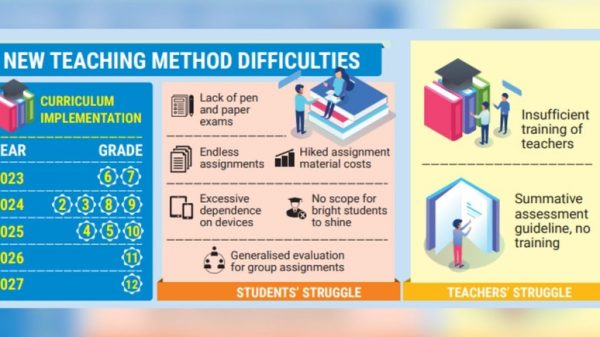Shawdesh desk:
Educationists have been appreciating the new school curriculum for its emphasis on practical education and removal of exams, but students, guardians as well as many teachers are struggling to cope up with it due to lack of clarity regarding student performance and evaluation, and increased pressure throughout the year in the new system.
The new curriculum is implemented only in the sixth and seventh grade this year, and is supposed to be introduced in other grades gradually, but some guardians have staged protests in the streets, demanding cancellation of the new system.
Teachers said a five-day programme was organised for training them to teach the new curriculum in classes, but many of them did not receive it. Besides, many teachers do not have a clear idea about evaluating students’ performance under the new system as there was only a guideline in this regard but no training at all.
At the same time, guardians complained that the new curriculum promised to reduce pressure on the students as there will be no exams, but actually the pressure has increased several fold, to an unbearable extent in some cases as there was no end to the class activities and assignments – the only criteria for evaluating the students.
The new system has also increased the cost of education as many things required for the assignments and other educational activities are not in the textbooks and can only be acquired through personal research using digital devices and extracurricular books or sources.
This in turn is increasing students’ dependence on digital devices to a harmful extent, alleged guardians, Tahera Akter Rupa, mother of a student of Viqarunnisa Noon School and College.
Another problem in this system is that teachers often assign projects and learning activities to groups of students. In many cases, only a couple of students in a group work hard to carry out the task, but the teachers evaluate all the students equally.
On condition of anonymity, a guardian told the Daily Sun that a teacher assigned sixth grade students at Viqarunnisa Noon School and College a group task of making a model of the solar system. The teacher divided the students of that class into groups of 12 for the assignment.
However, only five-six students in each group actively participated in building the model. The rest were aware of the matter but they were not involved actively. Nevertheless, the teacher evaluated all the group members equally.
This is a huge discrimination against sincere students, which might demotivate them in the end, alleged the guardians, demanding reintroduction of pen-and-paper tests for properly evaluating individual talents.
Professor Md Moshiuzzaman, member of the National Curriculum and Textbook Board (NCTB), told the Daily Sun, “Students are learning throughout the year in the new curriculum, because of which parents may feel that children are stressed. A number of commercial groups are also provoking guardians to give such reactions.
“Another thing is that – the more the new curriculum is discussed, the more we should consider that the system is working. The matter will be clarified only through discussion and criticism. I request all not to judge the new curriculum after only one year. You should have faith that the new curriculum will definitely bring positive changes.”
Teachers struggle to evaluate students in new system
The annual summative assessment of the sixth and seventh grades in the new curriculum has started from 9 November, which will be completed in three stages on 30 November. All the assessment information will be stored in the app named “Naipunya”. The Directorate of Secondary and Higher Education has sent guidelines for summative assessment to schools.
Many teachers have complained that they have been struggling to understand the guideline for evaluating students through the new app as there was no training on it.
Johura Begum, the principal of Udayan Higher Secondary School, told the Daily Sun, “There is no doubt about the effectiveness of the new curriculum. Children are learning with joy in the new method. However, the evaluation method seems to be a bit complicated as teachers were not given any training on assessment. So I think the evaluation process needs to be simplified.”
Johura Begum, a member of the NCTB, also said, “Since the entire assessment process is new, training alone will not remove the complexity. That is why we went straight to experiential learning. But we will solve the problems in this regard by taking into consideration the challenges that will arise.”
The new curriculum is being implemented for the sixth and seventh grades this year. For the second, third, eighth and ninth grades, it will be implemented in 2024, and for the fourth, fifth and tenth grades in 2025. After that, it will be implemented for the higher secondary level’s eleventh grade in 2026 and the twelfth grade in 2027.
Under the new system, there will be no separate strands like science, humanities and commerce in the ninth grade and students will have to study the same 10 subjects till the tenth grade.
There will be an option to choose a particular group like science, commerce, or humanities in the higher secondary level, according to the education ministry’s announcement.
Students will be evaluated at the schools till the ninth grade and the Secondary School Certificate exam will be based on the tenth grade syllabus. Then, there will be two separate public exams in the eleventh and twelfth grades.
























Leave a Reply